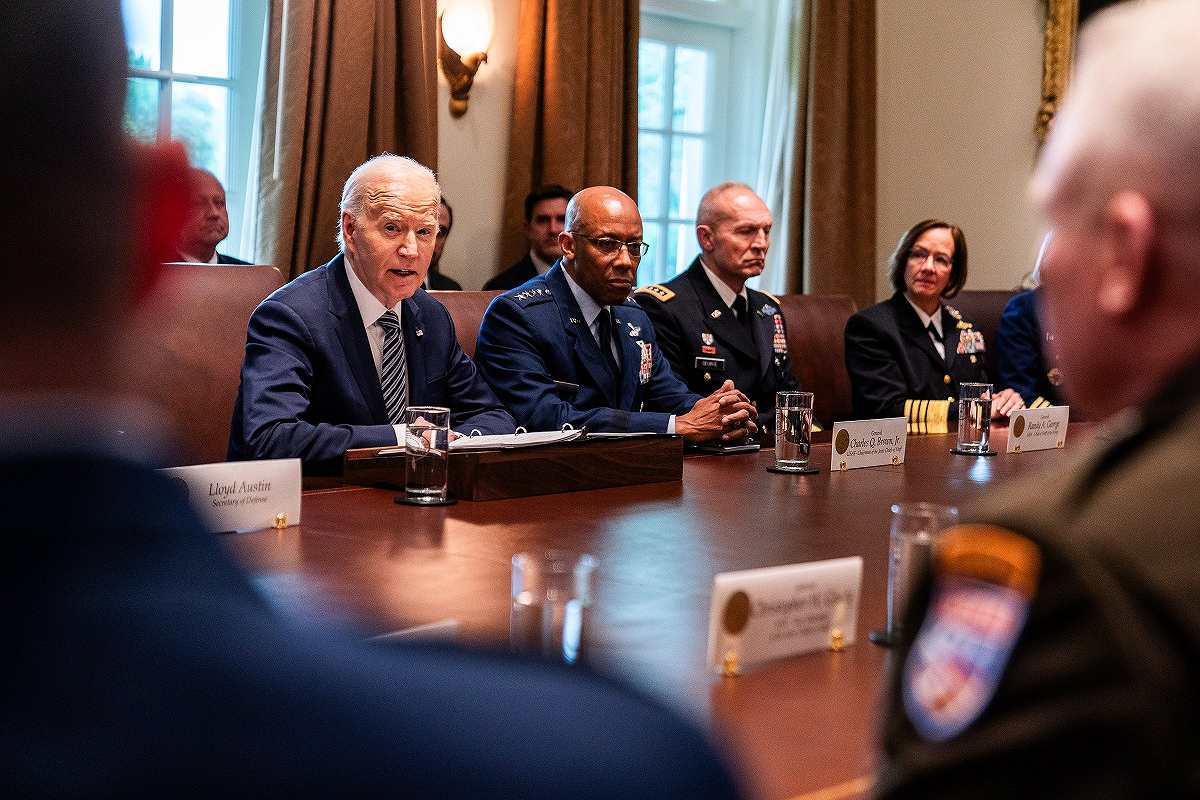
President Joe Biden hosts a meeting with the joint chiefs and combatant commanders in the White House on Wednesday.
16:19 JST, May 17, 2024
As he nears the end of his first term, President Biden, a long-standing institutionalist, is growing more comfortable using the full powers of the presidency – and in an election year, his latest actions have the added benefit of potentially shaping the political landscape in his favor.
On Thursday morning, Biden asserted executive privilege over audio recordings from the special counsel investigation into his handling of classified documents – blocking Republicans from using clips to attack or embarrass him in political ads.
In the afternoon, he publicly endorsed the Justice Department’s recommendation to loosen restrictions on marijuana, which came at his urging and could usher in a historic shift in the nation’s drug policy that Democrats hope will boost support among young voters and communities of color.
Taken together, the actions illustrate offensive and defensive efforts by Biden to protect against embarrassment and appeal to particular voting groups in his closely contested rematch with former president Donald Trump, as recent polls show Trump holding narrow leads over Biden in the key battleground states.
The moves also demonstrate the continuation of a shift by Biden, who after spending nearly four decades in the Senate was skeptical of unilateral presidential power, toward greater comfort with executive authority. They could help Biden address political vulnerabilities, as he parries Republican efforts to seize on his verbally awkward moments and seeks to shore up his support among young people.
Biden’s actions Thursday also came a day after he abandoned decades of tradition by moving away from the bipartisan Commission on Presidential Debates to arrange debates directly with Trump, the presumptive Republican nominee – a move that allowed Biden to dictate the terms to his benefit. Limiting the debates to two and holding them without a live audience, for example, could minimize the risk of gaffes for Biden while still exposing Trump to an audience that has not recently been exposed to his often-rambling style and more extreme policy agenda.
As a candidate for president, Biden said he would sign executive orders to overturn some of Trump’s policies, but he also expressed reservations about wide-ranging executive authority.
“Some of my Republican friends, and some of my Democratic friends even, occasionally say, ‘Well, if you can’t get the votes, by executive order you’re going to do something,’” Biden said at a town hall in October 2020. “Things you can’t do by executive order unless you’re a dictator. We’re a democracy. We need consensus.”
Biden allies argue that the president has sought consensus, resulting in bipartisan legislation on infrastructure, veterans health, gun safety and aid to Ukraine and Israel. But in recent months, Biden has also used his executive authority to cancel billions of dollars in student debt, raise tariffs on China and fight climate change.
“When you come out of the Senate like Biden, you are skeptical of executive power because it usurps legislative prerogative,” said Doug Brinkley, a presidential historian. “But every president since Theodore Roosevelt resorts to it while running for reelection to enhance their stature.”
Thursday’s assertion of executive privilege against House Republicans’ efforts to obtain audio recordings of Biden’s interview during an investigation of his handling of classified documents was a particularly unexpected move.
The White House said the chief motivation for the assertion of executive privilege stemmed from Justice Department concerns about the impact on future investigations of releasing the audio. Attorney General Merrick Garland asked Biden to exert privilege because the department feared providing the recordings to Congress could hurt future efforts to gain cooperation from administration officials, especially if they are asked to sit for recorded interviews.
Garland’s request was not without precedent; his predecessors in the Trump and Obama administrations also asked the president to exert executive privilege for investigative materials.
House Republicans are seeking the recording of Biden’s interview with special counsel Robert K. Hur, who concluded his investigation without filing any charges against Biden, arguing they needed it as part of their broader investigation into Biden and his family. But the White House argued their request was purely political, noting that the lawmakers had already received a written transcript of the interview.
“The absence of a legitimate need for the audio recordings lays bare your likely goal – to chop them up, distort them, and use them for partisan political purposes,” Ed Siskel, the White House counsel, wrote in a letter to the Republican-led House Oversight and Judiciary committees. “Demanding such sensitive and constitutionally-protected law enforcement materials from the Executive Branch because you want to manipulate them for potential political gain is inappropriate.”
Republicans, with Trump’s encouragement, have mounted an impeachment investigation of Biden, but they have been unable to present any clear evidence of wrongdoing. However, Hur, in his final report, referred disparagingly to Biden’s memory, and Republican leaders said the White House was reluctant to provide audio that would confirm that assessment.
“It’s a five-alarm fire at the White House,” Rep. James Comer (R-Ky.), the chair of the House Oversight Committee, said in a statement. “Clearly President Biden and his advisors fear releasing the audio recording of his interview because it will again reaffirm to the American people that President Biden’s mental state is in decline.”
The marijuana decision was, in contrast, months in the making, and it involved a policy shift rather than a tactical move in Biden’s battle with Congress.
The announcement that Biden favors reclassifying marijuana as a less-dangerous drug concluded a particularly remarkable shift for Biden who suggested marijuana could be a “gateway drug” as recently as 2019. Trump has not signaled he has any plans to change the country’s marijuana policies even as polls have found a majority of the country support legalization of marijuana for recreational use.
The change would move marijuana from a Schedule I drug – on par with heroin and LSD – to Schedule III, in line with prescription drugs such as ketamine, anabolic steroids and testosterone. It would not legalize marijuana federally, but it would allow marijuana businesses to deduct business expenses for taxes and could lead to the relaxation other cannabis-related rules for government employment, federal housing and visas.
“Far too many lives have been upended because of a failed approach to marijuana and I’m committed to righting those wrongs,” Biden said in a video posted on social media Thursday. “You have my word on it.”
Just before the 2022 midterms, Biden pardoned individuals convicted of a federal crime for simple possession of the drug and urged governors to do the same.
Brinkley said presidents like to issue executive actions close to elections because they often face legal challenges, but those take months to work through the courts. Executive orders, he said, also signal their policy priorities to voters.
“While you’re running for reelection, you use executive power on issues that you have been flummoxed on – when Congress hasn’t given you what you want and you’re doing an end-around,” Brinkley said. “When a president like Biden is seeking reelection, it’s a potent weapon to tell voters what side you’re on.”
If the marijuana decision was a policy choice and the assertion of executive privilege was a brushback of congressional Republicans, Biden’s move on the debates was aimed more directly at shaping the course of the 2024 presidential campaign.
In a letter to the debates commission on Wednesday declaring that the president would not participate in the group’s events, Jen O’Malley Dillon, Biden’s campaign chair, argued that the scheduled debates would start too late and were more geared toward a spectacle with crowds rather than an exchange of ideas. Biden’s aides also complained that the commission failed to enforce rules against Trump in 2020, particularly when he flouted regulations aimed at limiting the spread of coronavirus.
Shortly after the letter was released, Biden and Trump agreed to debates in June and September without a live audience, which Biden allies saw as a victory for the president. The earlier dates, they argue, will help clarify the two-person contest – a dynamic that Biden allies have been clamoring for – and give the president time to recover if he has a poor performance.
The lack of an audience will also prevent Trump from filling the crowd with supporters who could be rowdy, as evidenced by Trump’s town hall with CNN in May 2023. Both sides also wanted to avoid sharing a stage with Robert F. Kennedy Jr., who is mounting an independent bid for president.
“President Biden made his terms clear for two one-on-one debates, and Donald Trump accepted those terms,” O’Malley Dillon said in a statement. “No more games. No more chaos, no more debate about debates. We’ll see Donald Trump on June 27th in Atlanta – if he shows up.”
Top Articles in News Services
-

Survey Shows False Election Info Perceived as True
-

Hong Kong Ex-Publisher Jimmy Lai’s Sentence Raises International Outcry as China Defends It
-

Japan’s Nikkei Stock Average Touches 58,000 as Yen, Jgbs Rally on Election Fallout (UPDATE 1)
-

Japan’s Nikkei Stock Average Falls as US-Iran Tensions Unsettle Investors (UPDATE 1)
-

Trump Names Former Federal Reserve Governor Warsh as the Next Fed Chair, Replacing Powell
JN ACCESS RANKING
-

Producer Behind Pop Group XG Arrested for Cocaine Possession
-

Japan PM Takaichi’s Cabinet Resigns en Masse
-

Man Infected with Measles Reportedly Dined at Restaurant in Tokyo Station
-

Israeli Ambassador to Japan Speaks about Japan’s Role in the Reconstruction of Gaza
-

Videos Plagiarized, Reposted with False Subtitles Claiming ‘Ryukyu Belongs to China’; Anti-China False Information Also Posted in Japan

























